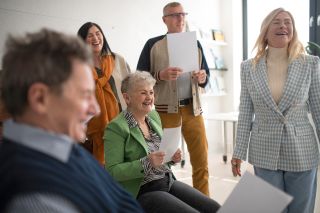Cognition
Group Singing Supports Communication in Aphasia
A randomized controlled trial demonstrates the effectiveness of singing.
Posted May 8, 2023 Reviewed by Michelle Quirk
Key points
- Singing-based group rehabilitation supports communication and speech production.
- Singing is beneficial even at the chronic phase of stroke.
- Including caregivers in the intervention supports their psychosocial well-being.
By Sini-Tuuli Siponkoski and Anni Pitkäniemi
Approximately 40 percent of stroke survivors experience aphasia, a language impairment that can affect their speech production and comprehension as well as writing and reading. In half of these cases, the language impairment persists more than one year after the stroke, while the availability of rehabilitation services typically starts to reduce. Aphasia often has wide-ranging effects on the functioning and quality of life of the survivors as challenges in expressing emotions and communicating with others can lead to social isolation and depression.
Moreover, aphasia does not affect merely the person with aphasia but also their family members, who face a heightened risk of depression and anxiety. Given also the increasing societal burden of stroke due to the age structure of the population, new, widely applicable rehabilitation tools are really needed to support recovery and functioning in aphasia.
How About Singing?
It has long been known that the ability to sing can be preserved even in severe aphasia: A person who has lost the ability to produce speech due to left hemisphere injury may still be able to sing a familiar song with lyrics.
Although the exact neural mechanisms behind this phenomenon are still unknown, singing has long been utilized in aphasia rehabilitation, particularly in the form of melodic intonation therapy (MIT) developed in the 1970s. In MIT, speech production is practised by utilising melody and rhythm and gradually progressing from singing toward speech production settings. While MIT has shown benefits for communication and speech production in aphasia studies, it is often not available in clinical settings, and its broader applicability is limited by labour-intensive implementation as an individual rehabilitation method.
How About Group Singing?
In general, group-based interventions provide a promising setting for rehabilitation because they combine training with peer support and are often cost-effective. Group-based singing could be a viable and versatile approach for aphasia rehabilitation because it combines verbal production with expressive music-making, emotional self-expression, enjoyable social interaction, and peer support.
Previous studies suggest that choral singing is well-accepted by persons with aphasia and may have positive psychosocial effects. But its broader role in aphasia rehabilitation has remained relatively unexplored, especially in clinical trials.

Enhancing Communication and Speech Production
In a recent study we conducted at the University of Helsinki, Finland, the effectiveness of a multicomponent singing intervention was compared with mere standard care in a randomized controlled trial. The four-month intervention consisted of weekly 90-minute choir singing sessions led by a music therapist and a trained choir conductor.
All 50 aphasic participants were in the chronic phase (>6 months post-injury) of aphasia and had different levels of language impairment ranging from mild to severe. They had the possibility to bring a family caregiver with them to the singing sessions.
Importantly, no previous musical experience was required to take part in the study. The choir repertoire consisted of well-known popular music and folk songs in addition to some new songs particularly composed for the purpose of the study. The training was designed to be accessible for all, independent of the level of aphasia and singing experience, as well as motivating and musically rewarding.
During each session, group-level MIT was also utilized to train useful phrases for everyday communication. The intervention also included home training of the choir material with easy-to-use tablet software. At the end of the rehearsal period, the participants and their caregivers arranged a small concert for their friends and family members. The effects of the singing intervention were assessed using questionnaires for persons with aphasia and their caregivers as well as neuropsychological tests measuring language production and cognitive functioning.
The results showed that, compared to standard care, the singing intervention improved self- and caregiver-reported everyday communication skills. It also enhanced responsive speech production, particularly naming and repetition skills, in the neuropsychological tests performed by blinded investigators. In practice, these skills could be reflected in the everyday ability of finding meaningful words in conversation or producing speech according to a model. The beneficial changes were sustained in a four-month follow-up after the end of the intervention.
The group singing sessions also offered a possibility for peer support and meaningful shared activity between the persons with aphasia and their caregivers. The questionnaire results showed that, compared to standard care, the singing intervention improved the social participation of the person with aphasia. Importantly, the singing intervention also reduced the psychological burden experienced by the caregivers, which also stayed at a reduced level months after the intervention had ended.
Conclusions and Future Directions
These findings clearly encourage the use of group singing in aphasia rehabilitation along with more traditional methods such as speech therapy. Importantly, group singing is suitable for most people, regardless of the level of aphasia and musical background. Among the participants in our study, there were both people with a strong choir singing background and beginners. It was particularly elevating to see people find the joy of singing and the courage to use their voices.
The observation that a singing intervention can be efficient even at later stages of recovery is promising and in line with the emerging body of evidence in stroke rehabilitation research. Exploring the findings from the current trial is ongoing. In the future, we are aiming to map the neural effects of the intervention and also further untangle brain correlates of singing and speech production to provide a deeper understanding of why singing is so effective.
References
Siponkoski, S-T., Pitkäniemi, A., Laitinen, S., Särkämö, E. R., Pentikäinen, E., Eloranta, H., Tuomiranta, L., Melkas, S., Schlaug, G., Sihvonen, A. J., & Särkämö, T. (2022). Efficacy of a multicomponent singing intervention on communication and psychosocial functioning in chronic aphasia: a randomized controlled crossover trial. Brain Communications, 5(1), fcac337. https://doi.org/10.1093/braincomms/fcac337




